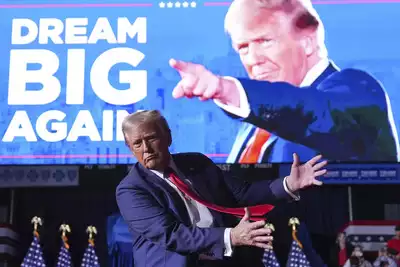Donald Trump returned to the White House after being given the green light to continue his journey as the elected president of the United States, which would shake the political horizon with many reactions.
How will the promises and policies under the leadership of Donald Trump transform the United States into another phenomenon, pushing it further into unprecedented territories? What implications will be triggered in its closest neighbor, Canada, by these events? When issues related to trade policies, defense spending, and the like come to the fore, a new face of this relationship between the two nations can be expected. Will the renewed presidency bring much-needed cooperation, or will it set things on fire?
Mixed Reaction in Canada Regarding Trump’s Win
Justin Trudeau should have spent time congratulating President-elect Trump through his post shortly after Trump was pronounced the winner during the elections. While Trudeau said he is optimistic about the ability to work together and admitted the reality of global politics, the history between the two leaders has been challenging.
Trump has thrown around some choice names for Trudeau in the past, including “far-left lunatic” and “two-faced,” and the mockery made by Trudeau of Trump during a NATO meeting in 2019 received quite a bit of coverage in the press.
Both leaders face domestic pressures—the threat of a snap election and low polling for Trudeau—so a stable partnership with Trump may be an uphill climb for Canada. The economic uncertainty that will likely accompany the bitter campaign, at least in the short term, could be compounded by the political instability that former Canadian diplomat Louise Blais feared.
Trade Troubles: The Looming Economic Threat to Canada
The United States and Canada have the world’s longest land border, and their trade relationship is over $1 trillion. Yet one of Trump’s promises has been a source of great anxiety—the imposition of blanket tariffs on all Canadian goods. Because 75% of all goods and services that Canada produces are exported to the US, any tariffs stand to snap the Canadian economy.
Economists warn that the tariffs will cut billions of dollars from Canada’s GDP and bruise its economy at a time when growth is already slowing. “This renegotiation of the USMCA in Trump’s first term is a useful precedent,” argued US-based policy adviser for the Business Council of Canada John Dickerman. However, there still needs clarity on how Trump’s second term will address this issue.
Among those, one worthy of mention is the Digital Services Tax that Canada introduced this year, 2021. Major foreign digital services companies are taxed at 3%. The US is displeased with it, and such animosity under Trump may escalate, making trade negotiations between the two countries even more difficult.
Defense Spending: Will Canada Obey Trump?
Among President Trump’s long-standing complaints against NATO partners has been defense spending. Throughout his first term, he hectored countries such as Canada to spend more, challenging them to meet the NATO target of 2% of GDP in defense. While Trudeau has committed to achieving that target by 2032, expectations from Trump might put added pressure on Canada to accelerate the process.
Already stretched to the limit on defense spending, officials may have to get creative enough to meet these demands. One avenue may be tapping into Canada’s vast reserves of critical minerals to support both national defense and economic growth. This, however, may weigh considerably on the ‘pay their fair share’ demand Trump is already making of NATO members.
Immigration and Border Security: Ticking Time Bomb?
Trump’s immigration policies, which included a credible threat of mass deportations, rang an alarm in Canada during his first presidency. Although the US-Canada border forms one of the world’s longest undefended borders, his policies still have a great possibility of straining this shared border, especially amid the continued flow of asylum seekers there.
Canada has already moved to rectify this by closing the loophole where people cross at unofficial points. However, Trump’s stance on immigration is a wild card, and the possibility of border tensions is realistic. Depending upon the assurances made by Deputy Prime Minister Chrystia Freeland, the government’s readiness for border security and how these two nations will solve this one remain to be seen.
The Road Ahead: Fragile Relationships
With Trump back in the White House, Canada faces a rather complex job of diplomacy as it figures out its new political landscape. Trudeau promised to work alongside the US, but tremendous barriers lie in their way- from trade to defense to immigration is still being determined if they will find common ground or if tension remains in their relationship.
Canada must be strategically shrewd about reacting to Trump’s policies and promises in the coming years. Whether this opportunity is a step closer to a much stronger partnership or another move towards further fiasco would depend on how effectively the nations could balance their respective national interests and thus continue with their long-wished ties.
For more reporting like this, please follow Newsdecensored on your favorite social media sites and bookmark the website. Thank you for your interest and support.















